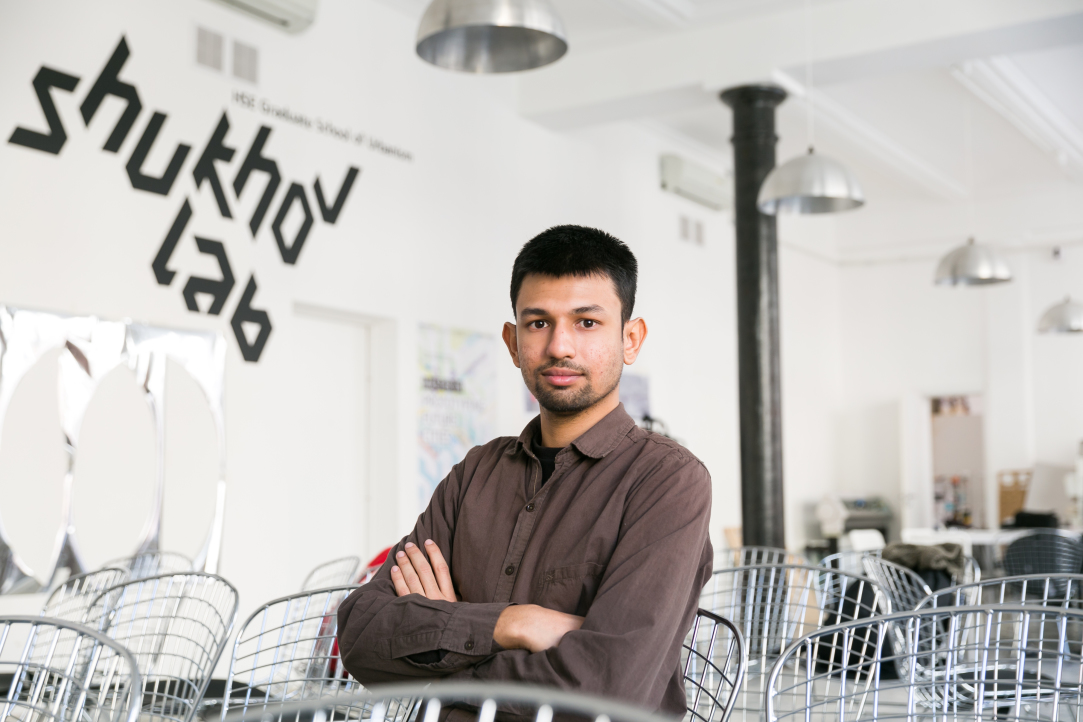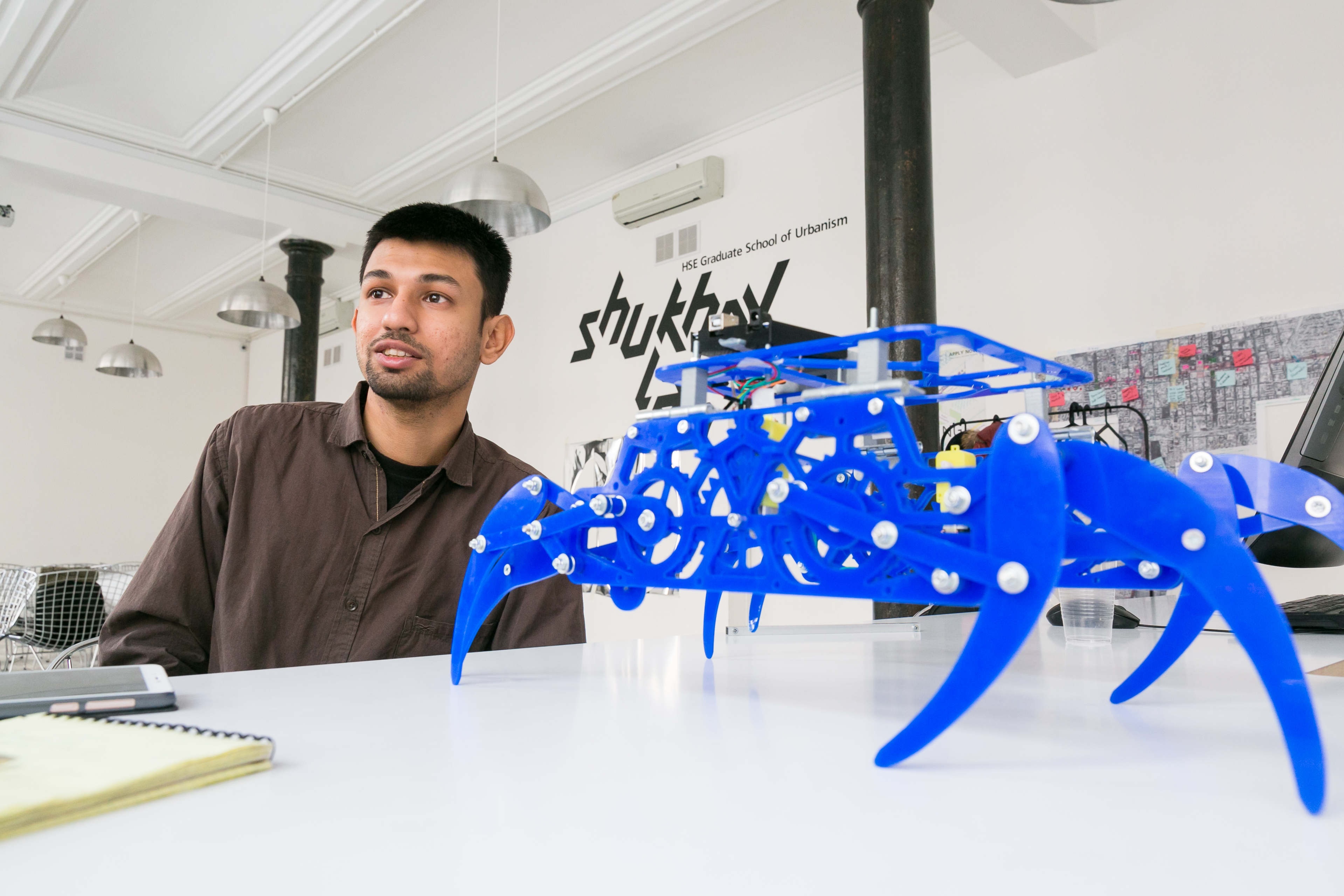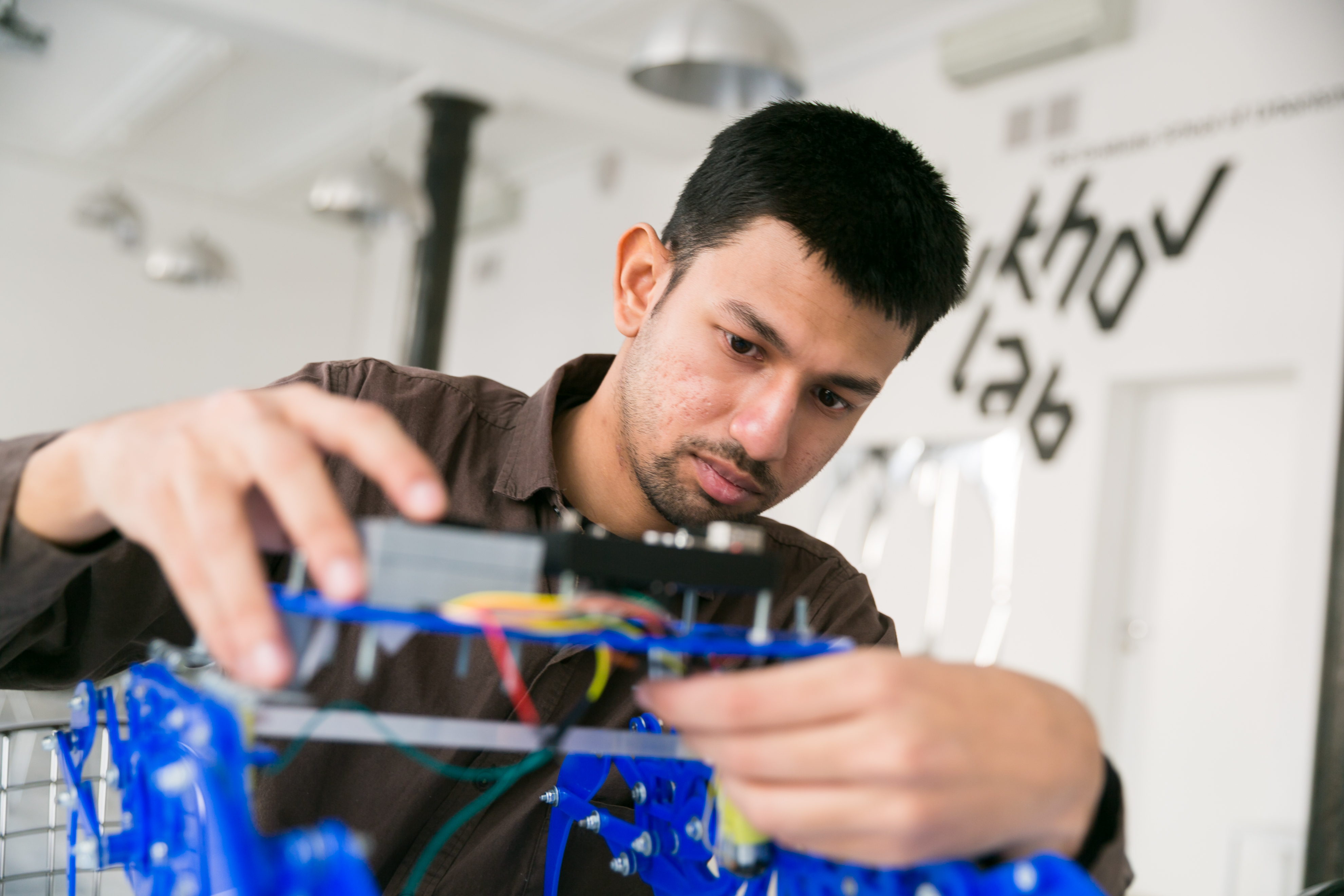‘Being Smart’ Will Mean Different Things for Different Cities

Neeraj Mazumder, a native of India, is a first-year student in the Master’s programme Prototyping Future Cities offered by HSE’s Vysokovsky Graduate School of Urbanism. He received his Bachelor’s in Architecture from Jawaharlal Nehru Architecture and Fine Arts University in Hyderabad and came to Moscow to study how cities can be analyzed and smart cities designed. He recently spoke to HSE News Service about his experience in the programme.
On choosing the programme
When I was researching programmes after finishing my architecture degree, I became really interested in HSE’s programme because it offered something I wanted to specialize in – the development of smart cities. In my country, the smart city industry is growing very fast but there are no programmes that offer studies in this field.
The programme is definitely not a 'sit and read your book' experience. It’s all about practical experience
Having completed my first semester here, I can say that the programme is definitely beneficial for me and I am able to learn quite a lot. It blends the expertise of professionals from different fields –architecture, design, business, and urban development – and gives us integrated knowledge and skills. Of course, my architectural background does help me in a way – I know how to use some software, for instance – but in this programme we are not making buildings; we are learning about the city and how new technology and ideas can be implemented. Take Zaryadye Park in Moscow, for instance. It’s one of the most innovative designs that has recently come to Moscow and already developed a reputation. It’s at the cutting edge of urban innovation. Our ultimate goal is to be able to create something like it – something new and special.

The programme is definitely not a ‘sit and read your book’ experience. We do have some lecture classes in various subjects – but these are not your usual lectures where you are just writing down notes. It’s all about practical experience. In a course on Business, we are given real life problems in the form of business cases along with relevant data sets we are asked to solve them in class. In many cases, the theoretical and practical teaching is mixed, which is very interesting because I didn’t expect it. At my home university, the teaching was very generalized – we had to design buildings and submit our projects, but we didn’t have such hands-on experience as here. I find the subject courses (sociology, business, and technology) very useful because it’s all very new to me – I didn’t study it before. All I knew was how to design buildings. Also, trying to connect ideas and knowledge from different courses is very interesting. It is quite challenging but enjoyable. This semester we’ll have some new courses, including some on how to introduce projects into the city and how to make cities more people-friendly.
On project work
Since the programme is very hands-on, in addition to subject courses, we do various practical technology-based projects. In the first semester, we were working in groups of two. It was actually very good for me – primarily because I don’t know any Russian. What I also found is that working together helps you develop your ideas. If you go on working alone, you have an idea and you stick to it. As a result, you actually lose your creativity because you are limited by the scope of your idea. But if you are part of a team, you can bounce your ideas off each other and discuss them. It allows you to think more creatively.

Our main objective was to think of how to implement smart technologies in a city. We were asked to first work on a smaller level – domestic or personal. The task was to identify a problem that we would like to see solved. So, we brainstormed collectively different problems to address, and then each group chose a project to work on. It was really interesting to see what kinds of ideas people came up with – even more so because we are all from different backgrounds. Most of us are architects, but we also have designers and even people from business. It’s a good mix.
When we were starting our projects, we had to think primarily about their relevance for the city. We wanted to address the problem of how people carry weight around the city. We researched how different age groups carry different objects and did a mini-survey as part of our group work. We wanted to make a device that would assist people in carrying weight so that they wouldn’t have to carry it with them or lug it around on a trolley. This would be especially useful in icy conditions – more so than a trolley. The idea was to create a multifunctional walking device that would carry one’s belongings and be suitable for different terrains. We also wanted it to climb stairs. The good thing is that it’s foldable, unlike trolleys, which are rather bulky. It fits perfectly into a backpack and can be carried around when it’s not being used.
The development period took six months. We did a lot of research – during three or four months –on how to solve the problem. Then our challenge was to build the mechanical device, which was not easy because none of us have the mechanical knowledge. So, we essentially built it by trial and error. We mostly worked on our project independently, but every week we had a session where we reported our progress to our tutors and discussed any problems. They gave us valuable feedback that was all very helpful. The tutors are very supportive and always available if we have a question about our project.

The Shukhov lab has a lot of resources at students’ disposal, including various tools and machinery. There is a very good laser cutting machine, which we used to carve the parts we needed out of special boards. We also found some things for our device in local DIY stores or right in the lab. When we made the first prototype, it did not work – it wouldn’t walk – so we had to go back and redesign it. There were a lot of problems that needed fixing, which required us to go through several phases of reworking it. Finally, we managed to make a device that would function as designed. We tested it on a very snowy day – we made it walk to a coffee shop controlling it with a smartphone.
A side benefit of working in a group is that I was able to learn some Russian along the way, which was nice. The programme is taught entirely in English, but when working on the technical side of our project it was sometimes necessary to learn the Russian names for some specific parts that we needed for our device – because this is specialized vocabulary and other students might not know what these things are called in English.
By the way, our classmates worked on a device that you can wear on public transport to combat foul odours around you. The capsules on this device emit special aroma – it’s a sort of a portable vaporizer activated via a smartphone. And there was another project for a breathable jacket – because it can be very cold outside and quite warm down in the metro.
On living in Russia
When I came here I expected that Moscow would be very cold – I’d been warned that winters are quite frigid. But this year it has not been that cold – I consider myself lucky. I had some problems with the language, but coming from India, where a lot of different languages are spoken in various parts of the country, I was used to being in a foreign-language environment. I had my first culture shock when I studied for my Bachelor’s degree back in India – because the people in the city of Hyderabad spoke a different language. So, here in Moscow it was already much easier. I quickly became quite comfortable. Sometimes I have had minor difficulties interacting with people in the streets, but slowly I’ve got used to it.
I find life in Moscow rather peaceful – I don’t know if others would agree with me, but this is how I feel. I’ve walked around the city quite a lot – it’s very convenient
Living and studying in Moscow is really good. First of all, Moscow is much less noisy than many Indian cities. Also, the traffic is much more organized and orderly than in India. I find life in Moscow rather peaceful – I don’t know if others would agree with me, but this is how I feel. I’ve walked around the city quite a lot – it’s very convenient. When I arrived in September, the weather was great, and I was able to explore the city. The centre of the city is very well maintained. The city is clearly developing fast and becoming more people-friendly. I know that many people say that they lack space for themselves in Moscow – some quiet areas where they can walk around and relax – but I think that Moscow is actually not as overpopulated as some Chinese or Indonesian cities. It’s much easier to live here and I enjoy it.
On a prospective career
Since this programme focuses primarily on cities, it gives me another specialization in urban analysis. If I am an architect, I make buildings: on a smaller scale, I design a house; on a larger scale – maybe a community. This programme gives me the benefit that I can now broaden my scope of research; instead of just working with houses or how they are built, or ecological issues, I can now address technology in the city or I can go into municipal administration, for example.
This is a Moscow-based programme, but the things we are learning are not only applicable to Russian cities. They are applicable to all cities that are implementing technological innovations. Smart cities can be anywhere in the world. How we are taught has diverse applications
I think I’d like to pursue a career in something related to municipal administration and working with people who are also interested in developing cities. Here, for instance, we have an opportunity to work with Google for map research data – to analyze how cities are growing. I might also develop my own business.
This is a Moscow-based programme, but the things we are learning are not only applicable to Russian cities. They are applicable to all cities that are implementing technological innovations. Smart cities can be anywhere in the world. How we are taught has diverse applications – I can apply the knowledge in business, art, etc. For instance, we had a sociology project where we had to analyze how people relate to a city, how people interact with a city and how the city interacts with people, and how the whole system works. It was a collective project by the students - some identified the borders in the city, others focused on artists in the city while I was trying to understand how people feel under different circumstances in the city and how their reactions differ.
I think that the programme is quite unique. Programmes like ours can help cities address problems such as traffic reduction, curbing noise pollution, and dealing with overpopulation. Smart cities will have a way of solving these problems. However, simply putting in the technology, like WiFi, smart display boards, driverless cars, charging stations everywhere, without addressing the fundamental needs of the local population does not make a city smart. If a city is suffering from overpopulation and people have no place to live, who will care about free WiFi? We have to start from the analysis of problems a particular city is facing and then work towards introducing technological solutions. In this respect, ‘being smart’ will mean different things for different cities - it is all very contextual.
Applications to HSE's Master's programmes are open until July 15, 2018. You can apply online.
See also:
HSE Students Come Up with a House of the Future
Perhaps, in the not-so-distant future, people will be living in skyscrapers made of wood and concrete with a farm on the first floor and solar panels on the roof. Such a model of a future residential block was presented by the students of the master's programme ‘Prototyping Future Cities’. To create the model, they studied houses in Moscow that have been built over the past hundred years and analyzed international experience. Their model was presented at the Moscow Urban Forum in July and, on September 13 (HSE Day), it will be possible to see it again at Gorky Park.
HSE to Participate in Moscow Urban Forum
The Moscow Urban Forum will take place from July 17 to 22 at Zaryadye Park. This year’s topic is ‘Megacity of the Future: New Space for Living’. HSE representatives will participate in the forum’s expert discussions.
HSE Master’s Students Travel to South Africa
Last year, a team of Advanced Urban Design students from the Graduate School of Urbanism and Strelka Institute embarked on a research expedition to Johannesburg, where they studied problems associated with food security, poverty and inequality.
Renovation: What Moscow Can Learn From Paris
The HSE Vysokovsky Graduate School of Urbanism has made a documentary on renovation in Paris. In it, government officials, architects and residents of the Paris suburbs discuss social and urban projects changing the city. The film was shown on December 21 at Shukhov Lab.
Unique Brain Surgeries and Electricity from Moss: HSE Scholars Present Their Discoveries at ONF Action Forum
At an exhibition held during the Russian Popular Front (ONF) Action Forum in Moscow, December 18-19, HSE neuro-linguists presented a method to preserve human speech after brain surgeries, and urbanists showcased sources of energy made of ceramics and moss.
Mayor of Milan Giuliano Pisapia: 'Be in love with your country, but also love other cultures'
On November 11, the HSE hosted an open lecture by Mayor of Milan Giuliano Pisapia. He talked about the upcoming international exhibition Expo 2015, which will take place in Milan from May-October next year, and about the transformations underway in Milan as an urban environment. He extended an invitation to HSE to take part in Expo Milano 2015, saying that Milan was 'ready to offer a forum for interesting projects' proposed by leading universities.


